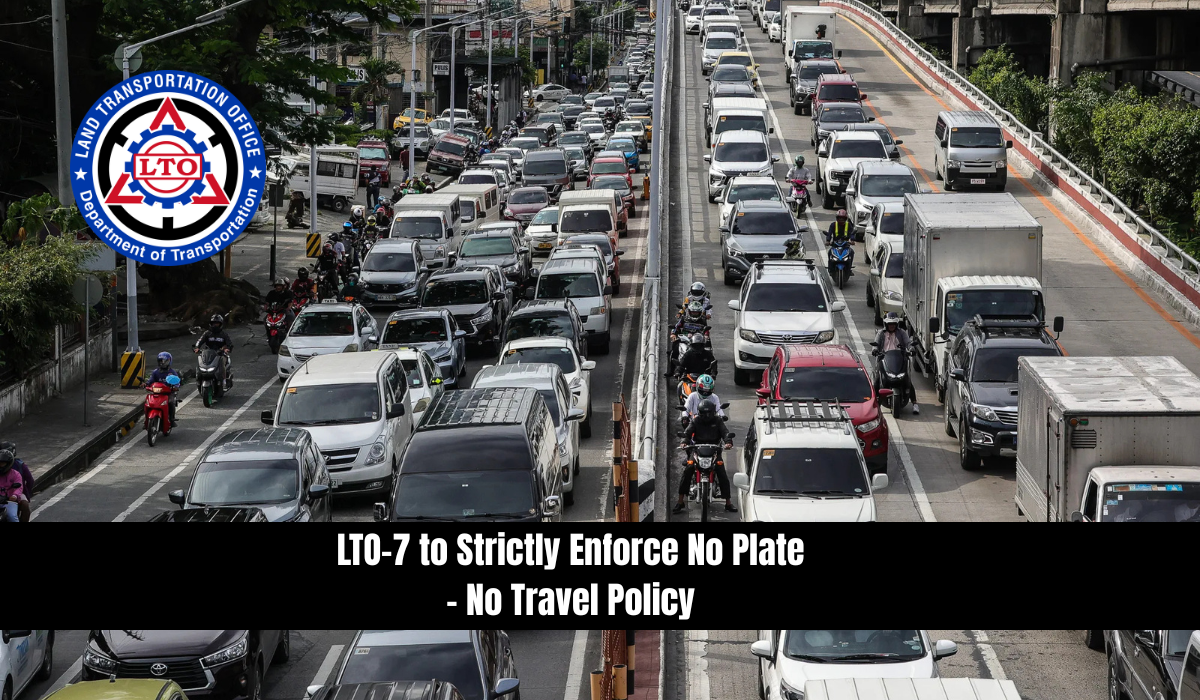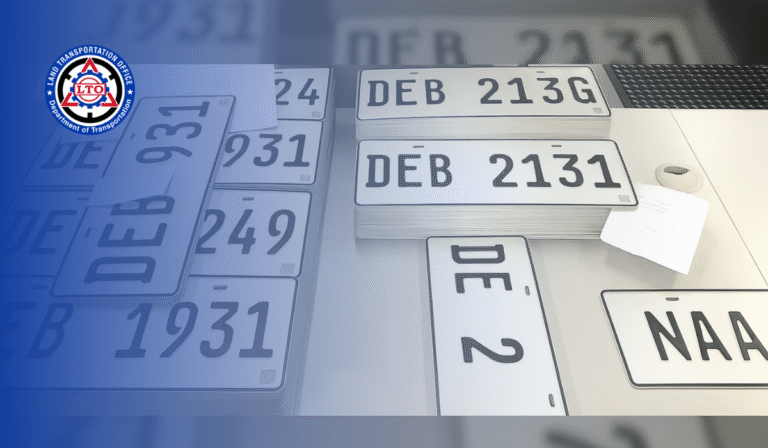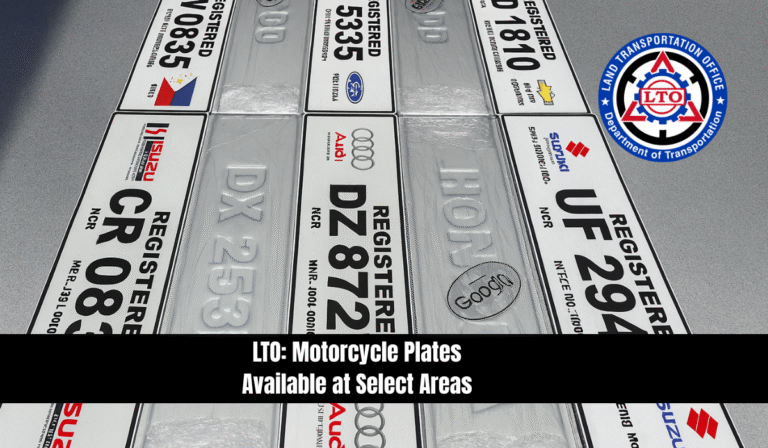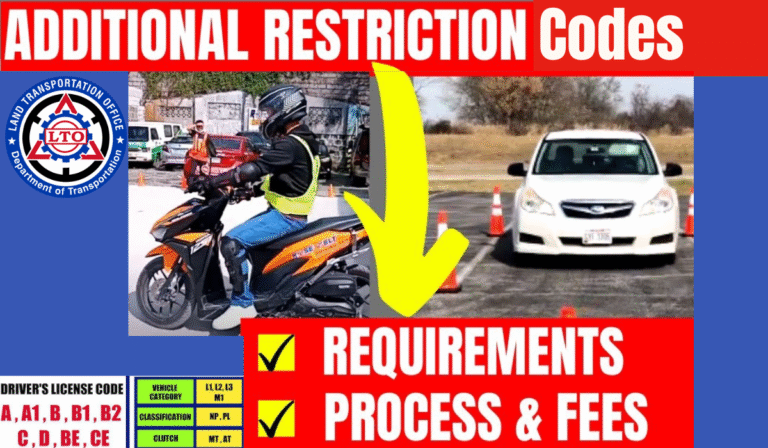LTO-7 to Strictly Enforce No Plate – No Travel Policy

LTO-7 to Strictly Enforce No Plate – No Travel Policy. The Land Transportation Office Region 7 (LTO-7) is set to implement a stricter version of the No Plate No Travel policy starting mid-August 2025. This enforcement move is part of the agency’s continuous efforts to promote road safety, enforce traffic regulations, and ensure proper vehicle identification across the Central Visayas region.
With over 100,000 plates already delivered to the region, LTO-7 is now calling on all vehicle owners, including tricycle operators, to promptly claim their official license plates to avoid fines and legal consequences.
What Is the No Plate No Travel Policy?
The No Plate No Travel policy, also commonly known as No Registration No Travel, is a nationwide directive that mandates all motor vehicles to be officially registered with the LTO and equipped with a valid license plate before being operated on public roads.
This policy ensures:
- Legal identification of vehicles
- Roadworthiness of units
- Accountability of owners
- Assistance to law enforcement in tracing illegal or suspicious vehicles
Starting mid-August, LTO-7 will tighten its enforcement, and motorists caught traveling without license plates whether using temporary plates or outdated registration identifiers—will face penalties.
Penalties for Violating the No Plate No Travel Policy
According to LTO-7 Regional Director Glen Galario, any motorist found violating the policy will be subject to a ₱5,000 fine. The penalty applies not only to unregistered vehicles but also to those still using:
- Temporary plates
- Improvised paper plates
- Old or defaced number plates
| Violation | Penalty |
|---|---|
| Driving without official plate | ₱5,000 |
| Using temporary/outdated plate | ₱5,000 |
| Failure to register vehicle | ₱5,000 |
Tricycles Are Not Exempt
Galario emphasized that tricycles, including units operated under TODA (Tricycle Operators and Drivers Association), are not exempt from the policy. Many tricycle units are still operating without their official plates, primarily due to past delays in production and distribution.
To address this, LTO-7 is now working closely with local government units (LGUs) and tricycle associations to collect essential details such as:
- Engine number
- MV (Motor Vehicle) file number
These details will help the LTO cross-check unassigned plates and fast-track the plate assignment process.
“We are requesting the cooperation of TODA members. If their units are still without plates, we will encode the information into our system and assign the appropriate plate,” said Galario.
Availability of Plates
Plates from 2018 Onwards
Plates for vehicles registered in 2018 and beyond have long been available. Vehicle owners who have yet to claim them are being urged to do so immediately.
Plates Registered in 2017 and Earlier
Plates for earlier registrations especially those from 2017 and before have only recently started arriving due to:
- Backlogs in manufacturing
- Delays in logistics
- Pending dispatches from the LTO Central Office in Manila
| Year Registered | Plate Availability | Remarks |
|---|---|---|
| 2018 – 2024 | Available | Can be claimed at the nearest LTO office |
| 2017 and earlier | Recently arriving/in transit | To be released before October 2025 deadline |
Galario confirmed that over 100,000 plates have already reached Region 7, but a large number remain unclaimed.
How to Check License Plate Availability
To simplify the process for vehicle owners, the LTO provides the following methods to verify the status of their license plates:
Option 1: Official Plate Tracker Website
- Visit the official LTO Plate Inquiry system
- Enter your vehicle’s MV File Number or Conduction Sticker Number
- View plate assignment and availability status
Option 2: Visit Nearest LTO Branch
- Bring a copy of your vehicle’s OR/CR (Official Receipt and Certificate of Registration)
- Verify status in-person with the plate release officer
LTO-7 Coordination with Local Government Units (LGUs)
In an effort to streamline communication and boost compliance, LTO-7 Director Galario paid a courtesy visit to Mandaue City Mayor Thadeo “Jonkie” Ouano. The goal was to seek local government support in reaching tricycle drivers and vehicle owners, particularly through the TODA networks.
This partnership is expected to:
- Help locate and inform unregistered vehicle owners
- Assist in collecting necessary registration information
- Speed up plate distribution and assignment
Why This Policy Matters: Importance of Vehicle Plates
The enforcement of the No Plate No Travel policy is more than just about penalties. It plays a vital role in:
- Public safety: Plates help identify vehicles involved in crimes or accidents.
- Regulation: Ensures that only roadworthy and properly registered vehicles are in operation.
- Ownership identification: Confirms the legal owner of the unit.
- Traffic monitoring: Assists LTO and law enforcement in tracking movement and identifying violators.
Galario stressed that license plates are a legal form of vehicle identification and must not be ignored.
LTO Final Reminder to Vehicle Owners
With only weeks remaining before full enforcement begins, the LTO strongly urges all motorists, tricycle owners, and commercial vehicle operators to take the following immediate steps:
- Check your plate availability via LTO’s official tracker
- Visit your LTO branch if the plate is available
- Claim your plate with OR/CR and valid ID
- Affix your plate to your vehicle as per regulation
- Remove any temporary or makeshift plates
Delays or negligence in complying may result in legal complications, traffic stops, and hefty fines under the No Plate No Travel policy.
FAQs About LTO-7 No Plate No Travel policy
What happens if I’m caught driving without a license plate?
Ans: If you’re caught operating a motor vehicle without a valid license plate or registration, you’ll be fined ₱5,000 under the No Plate No Travel policy. Additional penalties may apply depending on the violation.
How do I check if my plate is ready for pickup?
Ans: You can visit the LTO official plate tracker website or personally go to your nearest LTO branch with your OR/CR to check the status of your plate.
Does the No Plate No Travel policy apply to motorcycles and tricycles?
Ans: Yes. The policy applies to all motorized vehicles, including motorcycles, tricycles, private cars, and commercial vehicles. All must have official LTO-issued plates to travel legally on public roads.
Conclusion
The LTO-7 No Plate No Travel policy is part of a broader initiative to bring order, safety, and transparency to Philippine roads. With backlogs finally addressed and thousands of plates now available, vehicle owners have no valid reason to delay.






